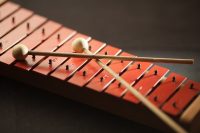Finally, I’m back! My apologies for the long hiatus—I was busy with several family matters. But everything is fine and now returning to normal, so it’s time to pick up where we left off way back in March (I can’t believe it’s been that long!)
Feel free to have a look back at our last installment to refresh your memory: we started a series on pairs or groups of words that are often confused because they sound the same, even though they’re spelled differently. The technical name for these is homophones. (I have to admit, as someone with a music background, that word has always made me chuckle—it makes me think of saxophone and xylophone and Sousaphone and so on. And by the way, I have no idea if the instrument in the photograph above is for real or not; it looks pretty fanciful, doesn’t it?)
Anyway, the homophones we focused on last time were relatively easy to recognize and sort out because one in each group has an apostrophe: it’s/its, who’s/whose, you’re/your, and they’re/their/there. So this time let’s broaden our scope a bit and look at a few more without apostrophes that are frequently used and frequently confused.

awhile/a while – This one is particularly tricky—you can find plenty of mistakes with these two even in published writing. And I must confess that I have to look it up every time! Awhile is an adverb—a word that modifies a verb (action word) and expresses when the action is done. But a while is a noun phrase meaning “a period of time,” and—here’s the best way to keep these straight—is usually used after a preposition—especially for—or before the words ago or back.
Examples:
I’m going to sit and read awhile. (no preposition or ago or back)
This is so relaxing that I’m going to read for a while longer. (after the preposition for)
I finished the other book a while back. (before back)
compliment/complement – A compliment is an expression of praise or flattery, while a complement is something that completes or perfects something else. They are also verbs: compliment means “to praise or flatter,” while complement means “to complete or to make better or perfect.” Here’s a mnemonic (memory device) that helps me keep these two straight: for compliment, think of the i in praise, while for complement, think of the e’s in complete.
Examples:
The reviewer complimented the author on her effective use of imagery.
Her latest novel complements her series of books about life in old Florida.
discreet/discrete – Unlike our previous two pairs, which are often confused because the meanings of the words are similar, discreet and discrete have very different meanings: discreet means “prudent, unnoticeable, or modest,” while discrete means “separate, distinct, unconnected.”
Examples:
A good editor must be discreet about discussing any details of an unpublished manuscript.
Many editors break down the editing process into discrete stages, first correcting major mistakes such as factual errors and inconsistencies, and only later fixing grammar and punctuation.
peak/peek/pique – The two words of this triplet that are most often confused are peak and peek. A peak is “an uppermost point or tip,” while a peek is “a quick, sneaky glance.” You can keep these two straight by thinking of peek—with two e’s—as something you do with your eyes—which also has two e’s. Pique as a noun means “resentment,” but is most often confused with the other two in its verb form in the phrase to pique one’s interest—in other words, to arouse it.
Examples:
I just read a fascinating book about an expedition to the peak of Mount Everest.
If you have a quick peek at the book’s table of contents, I’d bet it will pique your curiosity.

principle/principal – Here’s another pair of words that are often confused even in published writing. A good place to start is to remember that principle, which means “a rule or law,” can only be a noun (a thing). Principal, on the other hand, can be a noun meaning either “an authority”–most often encountered as the school principal–or the main chunk of money you have to pay off when you take out a loan. As an adjective (descriptive word), principal means “most important.”
Examples:
An important principle in journalistic writing is to summarize the whole story in the first sentence or two.
The high school principal approved the creation of a school newspaper and appointed a popular English teacher as the principal advisor for the project.
rein/reign – In its most basic meaning, a rein is the leather strap you use to steer a horse while you’re riding it, but it can also figuratively mean “restraint.” Reign, however, means “authority,” such as that held by a king or monarch, or the time that such a ruler holds power. I don’t have a very good mnemonic for this one, but the -gn- in reign might make you think of the -ng in king.
Examples:
Incompetent rulers often kept a tight rein on their subjects.
People were usually freer and happier during the reign of wise and benevolent kings.
sight/site – The word sight has many meanings, but all of them are connected with seeing: “something that is seen;” “the power or process of seeing;” “perception by the eye,” and so on. But site has nothing whatsoever to do with seeing—it means only “a place” or “location.”
Example:
While walking through the city, I caught sight of the new bookstore construction site.
strait/straight – As with sight/site, this is another pair with distinct meanings. A strait is a narrow channel between two large bodies of water. Its only figurative use is in the phrase dire straits (a situation of distress). But straight, which literally means “free from curves, bends, or irregularities,” has many figurative usages, most of them having a connotation of correctness or directness, such as keeping everything straight and a straight answer.
Example:
After passing through the Strait of Gibraltar, the ship sailed straight across the Mediterranean Sea to the Greek islands.

There are many, many, MANY more homophones—I just picked a few that I’ve seen more frequently than others. If you can’t get enough homophones, there are lots of lists on the Internet–check out this one, this one, or even this one. The main takeaways are to remember that homophones out there (maybe it’s because of our crazy spelling in English?) and to always doublecheck with a dictionary that you’re using the right one—even if you have to every time!
Which homophone pairs constantly trip you up? Or do you have any good tricks or memory devices for keeping everything strait straight? 😉 Please share them below!


